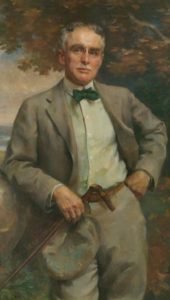
History
LUCKNOW ESTATE HISTORY
After earning his fortune in the shoe industry at the turn of the 20th century, Tom Plant focused his attention on the Ossipee Mountains in Moultonborough, New Hampshire. In 1913-1914, Tom and his wife Olive built a unique and stunning country estate, which they called Lucknow. The property spanned 6,300 acres and featured a 16-room Arts and Crafts mansion, stable and six-car garage, two gatehouses, a greenhouse, a golf course and tennis court, a man-made lake, a boathouse on Lake Winnipesaukee, and miles of carriage and bridle trails. For several years the Plants enjoyed a luxurious lifestyle at Lucknow, with state-of-the-art amenities, beautiful hand-made furnishings, and a large staff to run the estate.
Blending the Traditional and Modern
The Lucknow mansion is an unusual example of Arts and Crafts architecture in New England, expressing the aesthetic movement’s philosophy of living in harmony with nature. Designed by architect J. Williams Beal of Boston, the mansion was built with cutting-edge materials like steel beams, poured concrete, and terra cotta architectural blocks. The state-of-the-art amenities throughout the house include a central vacuum, ammonia-brine refrigeration, and a house-wide interphone system.
Despite these modern features, the home was designed to harmonize with its surroundings, using natural and sometimes local materials like Maine white oak timbers or local rhyolite and Conway pink granite for the stone veneer. These natural elements created a rustic, handcrafted look that best fit into the Arts and Crafts aesthetic. The overall design draws upon global architectural traditions and celebrates the work of the craftsmen that built the home.

Who were the Plants?
Thomas Gustave Plant was born in Bath, Maine in 1859 to French Canadian immigrants. He left school at age 14 to help support his family and worked a variety of jobs before taking an apprenticeship as a shoe laster in a factory. An industrious and driven individual, Tom rose from laborer to factory owner in only 11 years. He established the Thomas G. Plant Company at the age of 32, and, by 1910, his factory in Jamaica Plain, Massachusetts was the largest in the United States and the largest shoe factory in the world. That year, at the age of only 51, Plant sold his business to the United Shoe Machinery Company and began to plan his retirement.
On a trip to Europe in the fall of 1912, Tom met Olive Dewey and they were married in the spring of 1913. Olive was a well-educated young woman who had studied Greek at Wellesley College and worked as a school teacher. Together, Tom and Olive enjoyed the many outdoor activities Lucknow had to offer, especially riding their prized horses on the many trails on the estate.
By the early 1920s, due to a habit of overspending and some unwise investment choices, the Plants were no longer as financially comfortable as they had once been. They began mortgaging parcels of land and eventually decided to sell Lucknow. Despite their effort, no buyer was found and the estate was mortgaged to a friend. The Plants were fortunate enough to remain at Lucknow until Tom’s death in 1941, at which time the estate went into foreclosure and Olive returned to her family in Illinois.
« Thomas Gustave Plant (1859-1941)
A Summer Retreat: The Tobey Years
In the years after Plant’s death, Lucknow became the summer home of the Tobey family of Plymouth, NH.
The Tobey family – including Fred and his wife Susan, their seven adult children, and numerous grandchildren – summered at the mountaintop estate for 15 years. In an interview conducted in the 1990s, daughter Elizabeth (Libby) Tobey Gonnerman attested that Susan was the heart of Lucknow during their time on the estate. Susan adored the property so much so that she allegedly refused to lend the estate to President Eisenhower as a summer retreat, preferring to keep it for her family’s use instead.
In 1956, Fred Tobey sold Lucknow to Richard Robie, the man who would open the grounds to the public as Castle in the Clouds
Becoming “The Castle”: The Robie Era
In 1959, Lucknow opened to the public for the first time in decades, bearing a new name: Castle in the Clouds. Visitors were invited to tour the mansion and stable (today’s Carriage House), hike, picnic and enjoy ice cream on the property, and even take a burro ride to “Sunset Hill.” In subsequent years, Robie added other attractions, including a petting zoo and go-kart track for visitors to enjoy. After Robie passed away, his son, Richard Robie, Jr., continued operations until 1991.
Castle Springs: The Sticht Years
When the Castle Acquisition Partnership purchased the estate in 1991, they – including millionaire investor J. Paul Sticht – had plans for expansion. Although they continued to operate the Castle as a public attraction, their primary interest was developing Castle Springs bottled water, which began production in 1992. In 1995, the company added the Lucknow Brewery. Visitors to Castle in the Clouds during those years were treated to tours of the bottling plant and spring site, in addition to the historic mansion.
A Castle in the Modern Age
When the time came to separate the historic estate and the bottling plant in 2002, the Lakes Region Conservation Trust (LRCT) raised $5.9 million through private donations to purchase what remained of the Plant’s original Lucknow (roughly 5,500 acres). Soon after, the nonprofit Castle Preservation Society (CPS) was formed to manage Lucknow’s historic buildings and grounds, while LRCT continued to maintain the surrounding natural landscape.
Since 2006, CPS has been responsible for restoring and preserving the Plant home and legacy, and, in 2018, the property was added to the National Register of Historic Places. Today you can visit the historic Lucknow mansion, dine in our Carriage House Restaurant, during Music Nights, located in the original stable, feed the trout in Shannon Pond (the Plants’ man-made lake), grab a sandwich or an ice cream at Cafe in the Clouds, and hike or enjoy a trail ride on over 35 miles of trails maintained by LRCT.
It is our pleasure to preserve, interpret, and share this amazing house and property with the public, and we look forward to your visit!
Owned and operated by Castle Preservation Society since 2006, Lucknow is now open to the public for guests to enjoy. Revel in the beauty of the views, while taking in the magnificent features Plant had installed in his home. Enjoy a self-guided tour as if time stood still in the early 1900s. Rooms are set up as if Tom and Olive had just stepped out for the day, and vintage apparel adorns the house in closets. Experience life through the eyes of the Plants, and imagine yourself living in the Lucknow mansion with spectacular views from every room. Search for the innovations of the time – central vacuuming, ammonia brine refrigeration, and intercom systems.
Learn more about the history, architecture, property, and the rise and fall of Thomas Plant during your visit. Our knowledgeable and friendly volunteer docents and museum guides are willing and able to answer almost all questions!
Find out more about our Hours and Admission Rates! Visit our Program Calendar to see if we have any special events coming up during your visit!
“The oak woodwork (hand-hewn), which comprises a large part of the outside structure, was made by old-time craftsmen in the shipyards at Bath, Maine.
These men are skilled in the shaping and fastening together of ship timbers with oaken dowels, work that lasts a lifetime.”
– Thomas G. Plant, 1924 –

